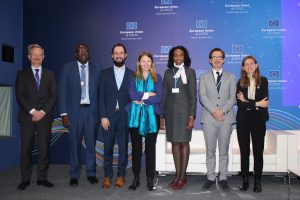SASSCAL convened and participated in a side event during COP 25 in Madrid, Spain on 13 December in the EU Pavilion. SASSCAL held the joint side event titled ‘Challenges and solutions for agricultural adaptation planning in Sub-Saharan Africa with Potsdam Institute for Climate Impact Research (PIK) and WASSCAL.

Session Panellists : Dr Karsten Hess (BMBF), Dr Savadogo Moumini (WASCAL), Dr Christoph Gornott (PIK) Dr Kira Vinke (PIK), Dr Jane Olwoch (SASSCAL), Dr Joergrg Helmschrot (SASSCAL) and Lisa Murken (PIK)
In his opening remarks Dr Karsten Hess informed the delegates of importance of strengthening regional capacities for climate adaptation. The establishment of SASSCAL and WASCAL has enhanced the visibility of science in Africa. Both regional initiatives are at the second phase of the Research Portfolio that aim to meet the immediate needs of the regions. Dr Hess emphasised that BMBF through the regional initiatives, capacitates young people. “Our aim is to produce young qualified youth with excellent skills to develop relevant climate forecasts and adaptive measures”, he added. Dr Hess concluded by reminding delegates that climate change is a regional problem that requires regional solutions, regional cooperation and integration.
SASSCAL Executive Director Dr Jane M Olwoch in her opening remarks noted that ‘the climate crisis that we are experiencing and the slow pace in responding is a fundamental realization of how long we have taken nature’s ecosystem services and functions for granted’. Dr Olwoch further noted that, generally, resources are quickly and efficiently assembled to abate political unrest, yet, climate crisis is a war like no other, it has far more reaching consequences because it questions our own survival as a human race. It is war that we can and must win she added.
Dr Olwoch highlighted the importance of international partnerships in addressing the challenges of climate change. The UNFCCC has recognized this fact in its several principles and mechanisms such as the Common but Differentiated responsibility principle in responding to climate change. No-one nation can do it alone, but strong and sustained partnerships between people, institutions and nations are required both for mitigation and adaptation she added. Dr Olwoch concluded her remarks by reminding the delegates that despite these challenges, ‘it is not a time to despair but time to re-organize ourselves because the answers lie within us. I am very encouraged by what I saw and heard at COP 25 and in particular the EU Green Deal. We look forwards to knowing more on what it means and how partnerships between Europe and Africa can further be strengthened from this deal and others in responding effectively to the global climate crisis” she concluded.
WASCAL Executive Director Dr Savadogo Moumini acknowledged the importance of understanding and identification of solutions as key drivers for adaptation. WASCAL plays a pivotal role in strengthening West African regional capacity through its pillars of Capacity Building, Research and translating research to derive Climate Services which are key to providing tailored strategies and information.
Local solutions supported by science are key to addressing climate change challenges, and Dr Joerg Helmschrot highlighted a few SASSCAL 1.0 achievements of co-production which included the Zambia bee farming project. Through SASSCAL Research the local community was trained on the whole bee keeping value chain as an alternative for income generation. The Botswana communities were trained on the use of indigenous plants to produce oil and jam. SASSCAL and WASCAL excellent research products are a living proof that partnerships in climate change research and capacity building have made commendable impacts on Africa’s development.
The session concurred that education and research are decisive for addressing global challenges. There is an urgent need for innovative capacity development to overcome global challenges. Co-production and co-ownership were also identified as pivotal to addressing these global challenges and thus the need to focus on designing adaptation strategies that are best suited for local needs. Co-production was also identified as a catalyst for science and community interface.




